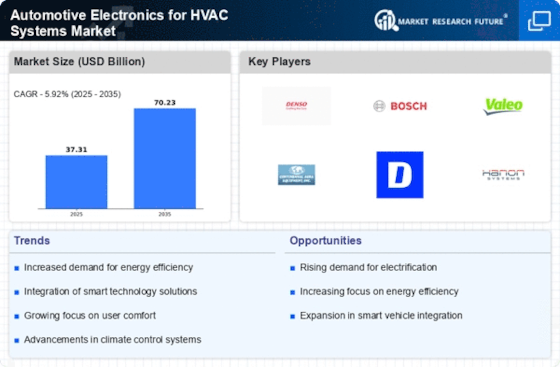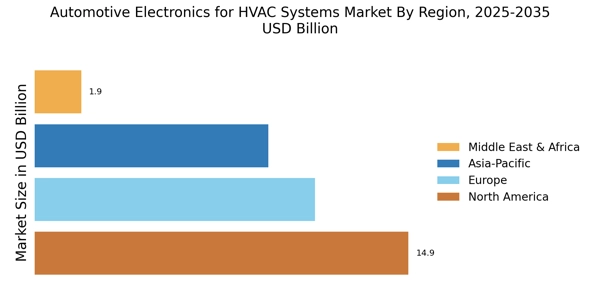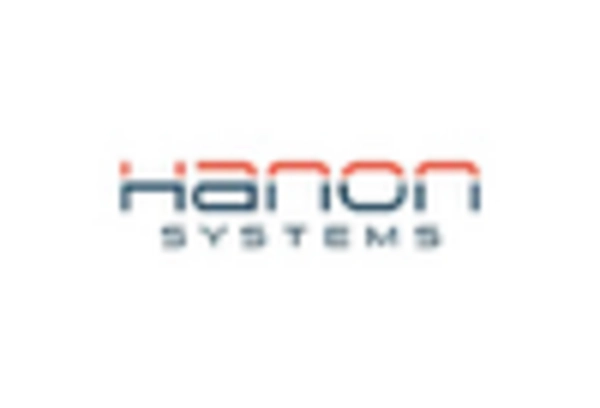Rising Demand for Energy Efficiency
The Automotive Electronics for HVAC Systems Market is experiencing a notable surge in demand for energy-efficient solutions. As consumers become increasingly aware of environmental issues, automakers are compelled to integrate advanced HVAC systems that minimize energy consumption. This trend is reflected in the growing adoption of variable refrigerant flow systems and heat pump technologies, which can enhance energy efficiency by up to 30% compared to traditional systems. Furthermore, regulatory bodies are imposing stricter fuel economy standards, prompting manufacturers to innovate and implement more efficient HVAC solutions. Consequently, the market for automotive electronics that support these energy-efficient HVAC systems is likely to expand significantly, as stakeholders seek to meet both consumer expectations and regulatory requirements.
Increasing Adoption of Electric Vehicles
The shift towards electric vehicles (EVs) is significantly influencing the Automotive Electronics for HVAC Systems Market. As EVs become more prevalent, the need for specialized HVAC systems that cater to the unique requirements of electric drivetrains is becoming apparent. Unlike traditional internal combustion engine vehicles, EVs require HVAC systems that can operate efficiently without relying on engine heat. This has led to the development of innovative solutions such as heat pumps and electric heaters, which are designed to optimize energy use. Market analysts predict that the EV segment will account for a substantial portion of the automotive HVAC market, with an expected growth rate of 20% annually. Consequently, the demand for automotive electronics that support these new HVAC technologies is likely to increase.
Regulatory Pressure for Emission Reductions
Regulatory frameworks aimed at reducing vehicle emissions are exerting considerable influence on the Automotive Electronics for HVAC Systems Market. Governments worldwide are implementing stringent emission standards, compelling manufacturers to adopt cleaner technologies in their HVAC systems. This regulatory pressure is driving the development of systems that not only improve air quality within vehicles but also reduce overall emissions. For example, the introduction of cabin air filtration systems and advanced refrigerants aligns with these regulatory requirements. As a result, the market for automotive electronics that facilitate compliance with these regulations is expected to grow, as manufacturers seek to enhance their product offerings while adhering to legal mandates.
Advancements in Climate Control Technologies
Innovations in climate control technologies are driving the Automotive Electronics for HVAC Systems Market forward. The integration of advanced sensors and control algorithms allows for more precise temperature regulation and improved passenger comfort. For instance, the implementation of dual-zone and tri-zone climate control systems enables personalized comfort settings for different areas within the vehicle. This technological evolution not only enhances user experience but also contributes to overall vehicle efficiency. According to industry estimates, the market for automotive climate control systems is projected to grow at a compound annual growth rate of 5.5% over the next five years. As a result, the demand for sophisticated automotive electronics that facilitate these advancements is expected to rise correspondingly.
Consumer Preference for Enhanced Comfort Features
Consumer preferences are evolving, with a marked inclination towards enhanced comfort features in vehicles, thereby impacting the Automotive Electronics for HVAC Systems Market. Modern consumers expect their vehicles to provide a superior level of comfort, which includes advanced HVAC functionalities. Features such as automatic climate control, air quality monitoring, and personalized settings are becoming standard expectations. This shift in consumer behavior is prompting manufacturers to invest in more sophisticated automotive electronics that can deliver these features effectively. Market Research Future indicates that the demand for comfort-enhancing HVAC systems is likely to grow, with a projected increase in sales of vehicles equipped with advanced climate control technologies. Consequently, the automotive electronics sector is poised for growth as it adapts to these changing consumer demands.


















